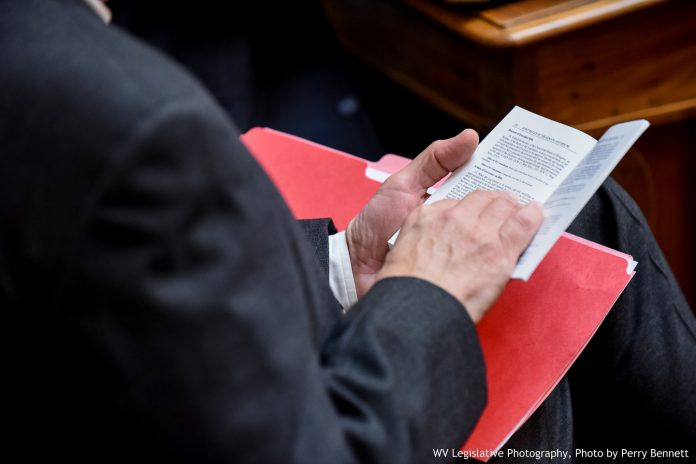Senate Bill 255 seeks to eliminate unnecessary, inactive or redundant boards, councils, committees, panels task forces and commissions. This bill would eliminate the following boards, councils, committees, panels task forces and commissions: West Virginia Sheriffs’ Bureau; Clinical Laboratories Quality Assurance Advisory Board; West Virginia Council on Aging; Care Home Advisory Board; Comprehensive Behavioral Health Commission; Public and Higher Education Unified Educational Technology Strategic Plan, including the Governor’s Advisory Council for Educational Technology; West Virginia Consortium for Undergraduate Research and Engineering; West Virginia Steel Futures Program, including Steel Advisory Commission; West Virginia Health Insurance Plan Board; Alternative Dispute Resolution Commission; and several others.
Senate Bill 298 will amend the provisions of the WV Code relating to how the funds of the WV Public Employees Retirement System (PERS) are treated for accounting purposes. It clarifies that the members deposit fund, the employer’s accumulation fund, the retirement reserve fund, the income fund and the expense fund are all a part of the Public Employees Retirement Fund and can be treated together for accounting purposes.
Senate Bill 299 will amend provisions of the WV Code relating to the timing of the payment of disability benefits to members of the State Police Retirement System. It adds the provision that disability payments will begin on the first day of the month following board approval and termination of employment or as ordered by a court of competent jurisdiction.
Senate Bill 302 make changes to the provisions of the WV Code dealing with disqualification for public retirement plan benefits. In addition to non-substantive and technical changes, the bill would make the following substantive changes: Adds the WV Municipal Police Officers and Firefighters Retirement System to the definition of retirement plan, thus having the disqualification provisions apply to this system; and Clarifies that if a member who was previously a member of the Teachers Defined Contribution Retirement System (TDC) and who has become a member of the State Teachers Retirement System (TRS) through election who has had his or her benefits terminated, that the member is refunded only his or her employee contributions and the earnings on those contributions. Any vested employer contributions from the TDC shall remain in the TRS to be used to offset future employer contributions.
Senate Bill 378 permits a previously licensed electrician who did not renew his or her license to renew that license without retesting if renewed within three years of the date of the last renewal. The Committee Substitute specifies that the license may be renewed provided that the license had not been revoked and provided that the applicant pays double or triple the fee depending upon whether the license had lapsed for two or three renewal periods, respectively.
Senate Bill 382 directs payment of certain claims made by those who have provided commodities and services to state agencies who have not been paid because if the claims were paid, the agencies would have unlawfully spent more than their authorized appropriations. The Court of Claims has reviewed and approved the payment of these claims, subject to the approval and appropriation of the Legislature.
The bill would continue the Medicaid upper payment limit program and adjust the tax rate. The program is an enhanced health care provider tax paid by acute care hospitals, with the tax proceeds used to draw down increased federal funds. The program provides that the increased federal funds received with the additional tax be distributed back to the hospitals that paid the tax on a pro rata basis. The bill would increase the enhanced tax rate from .62% to .72%. The increase would allow the level of funding received from the federal government to remain steady through the end of FY 2016.
House Bill 2099 would extend the time of meetings of local levying bodies when meetings are delayed. This bill provides a mechanism for extending the times when circumstances are beyond the body’s control. The Secretary of State is authorized to extend the time of meetings of local levying bodies within sixty days of the original deadline and to adopt procedures and rules for approving extending time to meet as a levying body.
House Bill 2726 would clarify choice of laws issues in product’s liability actions. The bill essentially would ensure that when a non-resident of the state brings a liability suit for a drug or any other product that the case is tried with the liability laws governing the location of the injury.
House Bill 2157 would provide that absentee ballot fraud or intimidation of voters is a felony. If a person is convicted of a violation under this section, he or she shall be fined $10,000 – $20,000, imprisoned for one to five years, or fined and imprisoned. Further, each ballot in violation of this section will be treated as a separate offense.
House Bill 2879 would amend current provisions limiting the amount of state funds in any depository in excess of the amount insured by an agency of the federal government or the amount insured by a deposit guaranty bond to not exceed 90% of the value of collateral pledged on the collaterally secured bond given by the depository. The bill changes current code to require the depository to have a deposit guarantee bond or other securities on any deposit beyond that guaranteed by the FDIC. The new limit of the amount to be secured by the depository in excess of the amount insured by an agency of the federal government must be at least 102% of the amount on deposit.

